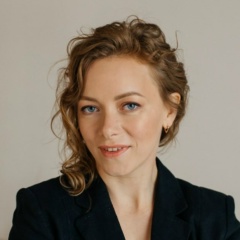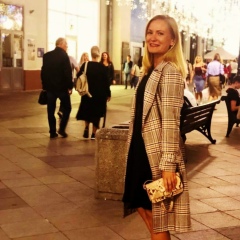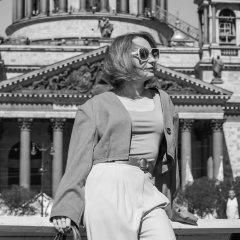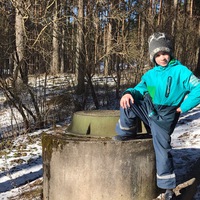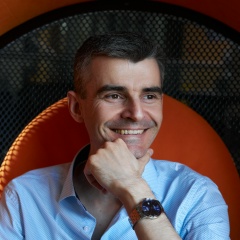Уважения пост. А ещё для родителей школьников и подростков.
Я тут запоем читаю Екатерину Мурашову. Проглотила штук 200 её статей на Снобе, книжку "Класс коррекции" и параллельно ещё несколько её книжек читаю. Интервью на YouTube смотрю-слушаю. И, как говорил ослик Иа-Иа, "замечательно входит".
Мурашову я начала читать потому, что считаю, что не очень хорошо умею общаться с детьми и понимать их. А Мурашова прям абсолютно прекрасна и непосредственна. Я ее читаю и внутри все дрожит от восторга.
Я прекрасно лажу с младенцами, я их чувствую и интуитивно знаю, что с ними делать, я их не боюсь, люблю, уважаю и, как будто, считываю. Поэтому когда я приезжаю на купашки или к замученной и ошалевшей молодой маме на консультацию, дети почти всегда затихают и не орут на большей части встречи, успокаиваются в воде или, о чудо, вообще не боятся, когда я их туда засовываю :)
Я, как мне кажется, неплохо общаюсь со своими детьми. Могу помолчать, могу поговорить, могу поспрашивать, пообнимать, поорать, посочувствовать или побеситься вместе с ними. Не пять с плюсом, но крепкая четверка точно, а порой и пятерка случается :)
С чужими детьми по другому. А ещё более сложно с чужими детьми в присутствии их родителей.
Мне хочется быть искренней с ними. Хочется проявлять к ним уважение. Наверное, хочется общаться с ними на равных. Но при этом я не знаю, что им нужно, чего они ждут, чего не хватает, что могло бы их поддержать. Для того, чтобы понять их, мне нужно время и спокойная обстановка, отсутствие давления и возможность ошибаться.
Редко, прям очень редко ко мне приходят подростки. Одни и без родителей. С ними мне как-то получается быть собой и не проваливаться ни в панибратство, ни в наставничество.
С детьми помладше сложно. Как правило потому, что родители с ними взаимодействуют с позиции сверху (советы, манипуляции, ЦУ, в худшем случае приказы или окрики). И формат "на равных" для них непонятный и настораживающий. И тут я теряюсь. Хочется их и пожалеть, и поддержать, и, с другой стороны, не хочется вставать в оппозицию к родителям, потому что зачастую я понимаю, что все это давление от большой любви и желания защитить. И когда на консультации сидят родители и ребенок, мне сложно балансировать в нейтральной позиции.
Быть нейтральной и быть собой с двумя взрослыми мне намного проще. И на консультации я часто сваливаюсь в формальное знакомство или общение с ребенком. Пропускаю важное и недовольна собой.
И потому зачитываюсь Мурашовой и безмерно уважаю Ирину Алексееву, которые умеют быть искренними и не теряться.
Я тут запоем читаю Екатерину Мурашову. Проглотила штук 200 её статей на Снобе, книжку "Класс коррекции" и параллельно ещё несколько её книжек читаю. Интервью на YouTube смотрю-слушаю. И, как говорил ослик Иа-Иа, "замечательно входит".
Мурашову я начала читать потому, что считаю, что не очень хорошо умею общаться с детьми и понимать их. А Мурашова прям абсолютно прекрасна и непосредственна. Я ее читаю и внутри все дрожит от восторга.
Я прекрасно лажу с младенцами, я их чувствую и интуитивно знаю, что с ними делать, я их не боюсь, люблю, уважаю и, как будто, считываю. Поэтому когда я приезжаю на купашки или к замученной и ошалевшей молодой маме на консультацию, дети почти всегда затихают и не орут на большей части встречи, успокаиваются в воде или, о чудо, вообще не боятся, когда я их туда засовываю :)
Я, как мне кажется, неплохо общаюсь со своими детьми. Могу помолчать, могу поговорить, могу поспрашивать, пообнимать, поорать, посочувствовать или побеситься вместе с ними. Не пять с плюсом, но крепкая четверка точно, а порой и пятерка случается :)
С чужими детьми по другому. А ещё более сложно с чужими детьми в присутствии их родителей.
Мне хочется быть искренней с ними. Хочется проявлять к ним уважение. Наверное, хочется общаться с ними на равных. Но при этом я не знаю, что им нужно, чего они ждут, чего не хватает, что могло бы их поддержать. Для того, чтобы понять их, мне нужно время и спокойная обстановка, отсутствие давления и возможность ошибаться.
Редко, прям очень редко ко мне приходят подростки. Одни и без родителей. С ними мне как-то получается быть собой и не проваливаться ни в панибратство, ни в наставничество.
С детьми помладше сложно. Как правило потому, что родители с ними взаимодействуют с позиции сверху (советы, манипуляции, ЦУ, в худшем случае приказы или окрики). И формат "на равных" для них непонятный и настораживающий. И тут я теряюсь. Хочется их и пожалеть, и поддержать, и, с другой стороны, не хочется вставать в оппозицию к родителям, потому что зачастую я понимаю, что все это давление от большой любви и желания защитить. И когда на консультации сидят родители и ребенок, мне сложно балансировать в нейтральной позиции.
Быть нейтральной и быть собой с двумя взрослыми мне намного проще. И на консультации я часто сваливаюсь в формальное знакомство или общение с ребенком. Пропускаю важное и недовольна собой.
И потому зачитываюсь Мурашовой и безмерно уважаю Ирину Алексееву, которые умеют быть искренними и не теряться.
Respect post. And also for parents of schoolchildren and adolescents.
I read Catherine Murashova binge here. I swallowed 200 pieces of her articles on Snob, the book "Correction Class" and at the same time I read several more of her books. Watching YouTube Interviews. And, as the donkey Eeyore said, "it is wonderful to enter."
I started reading Murashov because I think that I am not very good at communicating with children and understanding them. And Murashova is absolutely absolutely beautiful and direct. I read it and everything inside trembles with delight.
I get along very well with babies, I feel them and intuitively know what to do with them, I'm not afraid of them, I love, respect and, as if, read them. Therefore, when I come to kupashki or to a tortured and stunned young mother for a consultation, the children almost always calm down and do not yell at most of the meeting, calm down in the water or, lo and behold, are not afraid at all when I put them in there :)
I, it seems to me, communicate well with my children. I can be silent, I can talk, I can ask, hug, shout, sympathize or go wild with them. Not five plus, but a strong four for sure, and sometimes a five happens :)
With other people's children in a different way. And even more difficult with other people's children in the presence of their parents.
I want to be sincere with them. I would like to show respect for them. Probably, I want to communicate with them on equal terms. But at the same time I do not know what they need, what they are waiting for, what is missing, what could support them. In order to understand them, I need time and a relaxed atmosphere, lack of pressure and the ability to make mistakes.
Rarely, very rarely, teens come to me. Alone and without parents. With them, I somehow manage to be myself and not fail either in familiarity or in mentoring.
It is difficult with younger children. As a rule, because parents interact with them from a position from above (advice, manipulations, TS, in the worst case, orders or shouts). And the format "on an equal footing" is incomprehensible and alarming for them. And then I'm lost. I want to feel sorry for them and support them, and, on the other hand, I don’t want to get in opposition to my parents, because often I understand that all this pressure is from great love and desire to protect. And when the parents and the child sit in the consultation, it is difficult for me to balance in a neutral position.
Being neutral and being myself with two adults is much easier for me. And during the consultation, I often fall into formal acquaintance or communication with the child. I skip the important and unhappy with myself.
And therefore I read to Murashova and immensely respect Irina Alekseeva, who knows how to be sincere and not get lost.
I read Catherine Murashova binge here. I swallowed 200 pieces of her articles on Snob, the book "Correction Class" and at the same time I read several more of her books. Watching YouTube Interviews. And, as the donkey Eeyore said, "it is wonderful to enter."
I started reading Murashov because I think that I am not very good at communicating with children and understanding them. And Murashova is absolutely absolutely beautiful and direct. I read it and everything inside trembles with delight.
I get along very well with babies, I feel them and intuitively know what to do with them, I'm not afraid of them, I love, respect and, as if, read them. Therefore, when I come to kupashki or to a tortured and stunned young mother for a consultation, the children almost always calm down and do not yell at most of the meeting, calm down in the water or, lo and behold, are not afraid at all when I put them in there :)
I, it seems to me, communicate well with my children. I can be silent, I can talk, I can ask, hug, shout, sympathize or go wild with them. Not five plus, but a strong four for sure, and sometimes a five happens :)
With other people's children in a different way. And even more difficult with other people's children in the presence of their parents.
I want to be sincere with them. I would like to show respect for them. Probably, I want to communicate with them on equal terms. But at the same time I do not know what they need, what they are waiting for, what is missing, what could support them. In order to understand them, I need time and a relaxed atmosphere, lack of pressure and the ability to make mistakes.
Rarely, very rarely, teens come to me. Alone and without parents. With them, I somehow manage to be myself and not fail either in familiarity or in mentoring.
It is difficult with younger children. As a rule, because parents interact with them from a position from above (advice, manipulations, TS, in the worst case, orders or shouts). And the format "on an equal footing" is incomprehensible and alarming for them. And then I'm lost. I want to feel sorry for them and support them, and, on the other hand, I don’t want to get in opposition to my parents, because often I understand that all this pressure is from great love and desire to protect. And when the parents and the child sit in the consultation, it is difficult for me to balance in a neutral position.
Being neutral and being myself with two adults is much easier for me. And during the consultation, I often fall into formal acquaintance or communication with the child. I skip the important and unhappy with myself.
And therefore I read to Murashova and immensely respect Irina Alekseeva, who knows how to be sincere and not get lost.


У записи 22 лайков,
2 репостов,
657 просмотров.
2 репостов,
657 просмотров.
Эту запись оставил(а) на своей стене Инга Кузнецова





